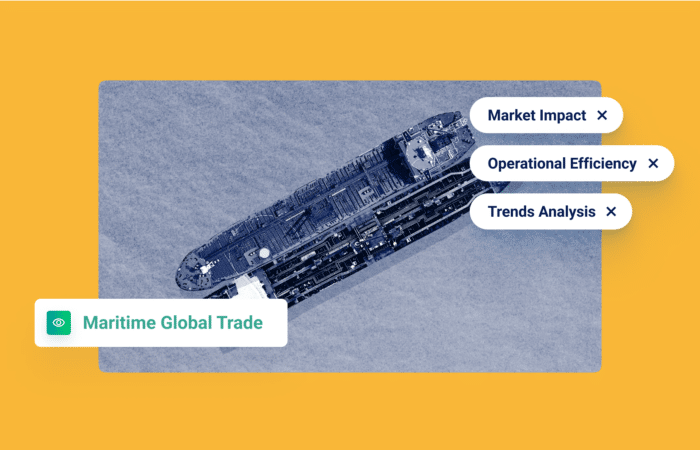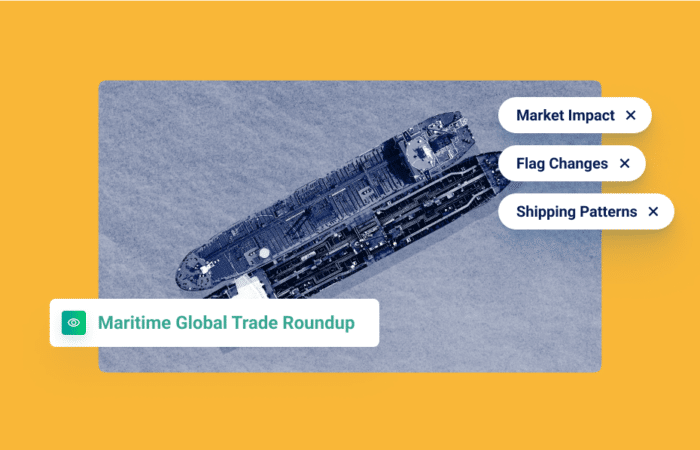What’s inside?
Russia’s war is still raging, sanctions are wide ranging and complex, and an oil price cap is in place. It’s important to understand what has happened, where we are going, and how to stay ahead of the curve. We’ve got you covered!
Windward’s recent webinar, Navigating deception: the impact of Russia’s invasion on the maritime ecosystem, featured a panel of experts who provided interesting viewpoints on the legal and commercial impact of the war, as well as a deeper look at deceptive shipping practices.
A Legal Perspective on Russia Sanctions
From a legal perspective, according to Siiri Duddington, Partner at Hill Dickinson LLP, no one could have envisioned the scale of sanctions that have been issued as a consequence of the war. The sheer number of sanctions packages issued by the sanctions authorities, most notably the EU and the UK, have targeted the financial, trade, energy, technology, and defense sectors. This has made it difficult for the industry, which has also had to deal with issues of interpretation, exceptions, and the impact of a sanctioned individual’s interest in a business, etc.
Russia’s sanctions program is unique, according to Siiri, because of the concerted effort by the G7 to prohibit Russian oil imports completely, and further to prohibit transport and related services of oil to third-party countries unless it complies with an oil price cap. This has all been set against the backdrop of a worldwide energy crisis. The coordinated approach has also been unique, and the war doesn’t seem to be showing signs of abating, making for a complex sanctions landscape over the next year, or possibly longer.
The Commercial Impact
In recent years, both Venezuela and Iran have been sanctioned. But what makes the sanctions on Russia so different, and why have they made such an impact on the market?
According to Ioannis Papadimitriou, Senior Freight Analyst at Vortexa, there are two main differences between previous sanctions and the current sanctions on Russia:
- Russia is a huge energy exporter whose impact extends beyond crude oil, to clean and dirty petroleum products.
- Any discussion of penalization came at a time when the energy demand was high and many questions revolved around energy security. The G7 and EU understood the need for Russian oil to still flow, to stabilize oil prices and not burden consumers.
Due to these two reasons, the sanctions are not a global outright ban, as was seen with Iran and Venezuela. These were also the reasons that gave birth to the price cap regulations. The fact that trade with Russia is still allowed, makes the whole situation complicated, with deceptive shipping practices on the rise and bad actors becoming more creative.
Deceptive Shipping Practices
Based on Windward’s insights, the recent The New York Times article stated that, “[AIS manipulation] is a technology enabling the transmission of fake locations to carry out murky or even illegal business operations could have profound implications for the enforcement of international law.”
According to Ami Daniel, CEO & Co-Founder of Windward, who was part of our expert panel, deceptive shipping practices are constantly evolving and many in the shipping industry are not screening for illicit activities. If businesses aren’t implementing due diligence strategies or using artificial intelligence, staying ahead of this cat-and-mouse game is nearly impossible. This makes it easy for businesses to fall prey to bad actors and end up harming their reputation or bottom line (or both).
Looking at a recent case, such as the incident featuring the Nobel, can provide a deeper understanding of these complex deceptive shipping practices and how important due diligence is.
The Nobel – Use Case
Looking at the Cameroon-flagged tanker named Nobel illustrates how DSP typologies evolved during the past year. The Russian-owned vessel has been flagged as high-risk in Windward’s Maritime AI™ platform since November 2021 for many risk indicators, such as location (GNSS) tampering, irregular business structure, STS operations, and multiple identity changes.

The Nobel was identified as loitering for three days in the Mid-Atlantic polygon in October 2022, without any economic or commercial reason for being there. It then did a course deviation and loitered for a few more days off the shore of Malta. Following these two loitering periods, it updated its draft from 7.5 to 12.0.
There were no reported port calls or STS engagement, indicating it received oil from a semi-dark activity (the other party/parties likely had its/their AIS disabled) either in the Mid-Atlantic, or Malta.
Following its suspicious draft change and after a few course deviations and meetings with cargo vessels, the Nobel called port in Turkey for five days in November 2022. It updated its reported draft to 7.4, indicating it discharged oil in Turkey.
On November 25, the vessel entered the Black Sea and then anchored in Russia for 13 days. A day after its departure, it updated its draft to 0, and a day later again to 7.4 – without any reported STS engagements or port calls. What was it carrying?
On December 11, the Nobel began manipulating its location, until December 29, when it reported another increase in draft, to 8.7.
Following the GNSS manipulation, it met with a few tankers, until it left the area on January 25, 2023.


The Nobel entered the new hub we identified, offshore Ceuta, on February 5, and as was also published in The Maritime Executive article, had an STS meeting on that day with the Elephant, a Vietnamese-flagged vessel. The Elephant has been flagged in our system as a moderate risk due to its meeting with the Nobel, and a few port calls it previously made in Russia.
Following the meeting with the Nobel, the Elephant updated its draft from 10.7 to 15, and immediately continued to a second meeting with another vessel. The Elephant then updated its draft again to 13.8.
Next, the Nobel remained in Ceuta and was drifting there as of February 15.
It’s interesting to note that while the third-party vessel was detained for being involved with the Nobel secondhand, the Elephant, which had a direct interaction with the sanctioned vessel, called port in another Spanish port, Ferrol, on February 11. This indicates the smuggled Russian oil made its way to Spain after all.
This singular case study is indicative of the trends and combinations of DSPs Windward is seeing from vessels attempting to evade sanctions and capitalize on Russian oil and oil products trading.
Loitering in areas that would be advantageous for oil smuggling; significant draft changes without any registered port calls, indicating semi-dark ship-to-ship engagements; GNSS manipulation – this was a common combination of DSPs in 2022.
Stay Ahead
Our recent webinar features many more insights than what was briefly covered here, and listening to the experts we assembled can help you stay ahead of the quickly shifting landscape.















